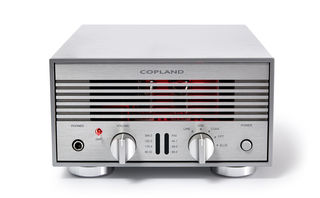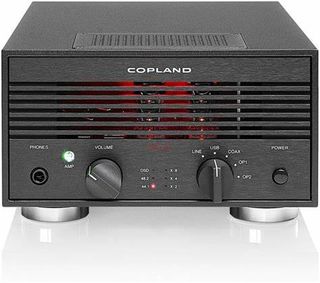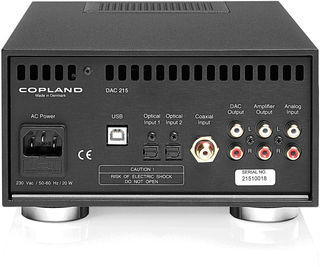The digital revolution has made music easily accessible. Thanks to the convenience and impressive sound quality of computer sourced digital music files, many audiophiles consider their personal computer or laptop as their primary audio source. Connected to a computer the DA215 will process audio data of extremely high resolution and the playback quality will be defined mainly by the data itself.
Connected to a computer the DA215 will process audio data of extremely high resolution and the playback quality will be defined mainly by the data itself.
The heart of the DA215 is an excellent D/A converter with multiple S/PDIF inputs, PCM, and DSD capabilities using the ES9018 Reference 32-bit DAC in quad-mono configuration, 8 mono to 2 stereo configuration.
Combining four in-phase and four opposite-phase converters per channel, the statistical properties of the signals are taken to advantage; the signal power of the phases correlate and add-up in constructive addition, whereas the noise power of the phases are de-correlated, improving the signal to noise ratio of the resulting analog waveform.
The class-A buffering technology of the analog filtering sections is borrowed from the highly acclaimed Copland CD-players and composed by discrete transistors producing a stunning sound quality with an unconstrained mobility and acceleration.
The DAC215 incorporates an asynchronous USB input, tree S/PDIF digital inputs, an analog input, two analogue outputs (fixed and variable) and a complete pre-amplifier with analog volume control and front panel headphone output featuring vacuum tube gain stages.
You can use the DAC215 for headphone playback. However, you can also use it as a high-end pre-amplifier with volume control, using the amplifier RCA outputs.
The volume control and pre-amplifier functionality can be bypassed for pure DAC mode. The DA215 USB input implementation is featuring USB 2.0 PCM 24/32 bit data transfer to 384 kHz, including native DSD64 and high resolution DSD128.
The input is converted to i2s and it is connected directly to the DAC chip. Once connected, the computer recognizes the DAC and routes the digital audio data to it, bypassing the source device’s internal audio circuitry.
The asynchronous USB-B port connects to the computer’s USB-A port. No power is taken from the computer. The regulated power supply for the USB input section has its own winding of the power transformer and the noisy computer line is completely interrupted by the use of digital Isolators.







